風蕭蕭_Frank
以文會友1...尚達曼:新加坡選出一位本可以更出色的總統
2...新加坡人在罕見的政治醜聞後投票選出禮儀總統
3...新加坡:城邦遭遇罕見的政治醜聞
尚達曼:新加坡選出一位本可以更出色的總統
https://www.bbc.com/news/world-asia-66643667
作者:Tessa Wong,亞洲數字記者,BBC 新聞,2023 年 9 月 1 日
Getty Images 總統候選人尚達曼(左)和他的妻子 Jane Ittogi 於 2023 年 8 月 22 日抵達新加坡總統選舉提名中心時揮手致意。尚達曼先生與他的妻子 Jane Ittogi 一起出現在這裏,他一直是明顯的領跑者。
新加坡人選擇尚達曼作為他們的下一任總統——但許多人在這樣做時會發出一絲失望的歎息。
周五,這位前總理以創紀錄的 70.4% 的得票率輕鬆擊敗了另外兩名候選人,這是該國十多年來首次有爭議的總統選舉。
尚達曼先生一直是明顯的領先者。他溫文爾雅、談吐流利、聰明睿智,深受新加坡人的尊敬,並一直被民意調查為島上最受歡迎的政治家之一。
這就是為什麽當尚達曼先生幾個月前宣布退出執政的人民行動黨 (PAP) 競選總統時,許多新加坡人感到困惑,他們認為這是在浪費他的潛力。
總統的角色主要是禮儀性的,除了對新加坡龐大的財政儲備的使用有一定的發言權外,幾乎沒有什麽權力。它在公共事務上的發言權就更少了——有權罷免總統的政府已經明確表示,總統不能說話太隨意,並將這一角色比作英國君主。
許多人認為,這是一個名義上的領袖角色,適合一個和藹可親、不具爭議性的人擔任,就像過去的總統一樣。但尚達曼先生遠不止於此。
除了擔任財政部長和副總理,幫助領導新加坡的政治領導層外,這位前經濟學家還擔任過聯合國和國際貨幣基金組織 (IMF) 等全球機構的高級理事會職務。有一段時間,他甚至被提名擔任國際貨幣基金組織的負責人。
一些新加坡人認為,如果他離開人民行動黨,他將繼續在國際舞台上嶄露頭角。
甚至更多的人希望他能成為總理。幾年前的一項調查顯示,他是現任總理李顯龍下台後成為總理的首選。在大選中,尚達曼先生的選區通常得分最高,僅次於李先生的選區。
這種受歡迎程度的部分原因在於,作為一名長期的副手,尚達曼先生的聲譽一直受到保護,沒有像李先生那樣遭受公眾批評的攻擊。
但這位 66 歲的老人也樹立了紳士形象,不像其他一些政客那樣進行人身攻擊。這讓喜歡溫文爾雅、有政治家風度的領導人的選民很滿意。
許多人認為,尚達曼有能力和地位成為新加坡第一位非華裔總理,打破政府長期以來堅稱是不可逾越的玻璃天花板。
人民行動黨領導人以種族現實政治而聞名,他們經常重申,新加坡是一個華人占多數的國家,還沒有準備好接受少數族裔總理。
尚達曼先生對這個話題保持沉默,直到上周他說,他認為新加坡已經準備好了,這加劇了他的支持者的失望情緒。
但尚達曼先生也堅稱自己不適合當總理,而且隨著人民行動黨的新領導層在等待上台,可以說他已經走投無路了。一種理論認為,人民行動黨希望他競選總統,以幫助培養下一代領導人。
因此,他選擇競選總統。盡管新加坡過去曾有過非華裔總統,但尚達曼先生是第一位由公眾投票選出的總統。
他的支持者可以聲稱他的勝利是代表權的勝利和對種族主義的否定。在選舉前夕,一些社交媒體帖子堅持認為新加坡必須有華裔領導人。尚達曼先生的兩位競爭對手都是華裔。
Getty Images 總統候選人黃國鬆(中)抵達新加坡投票站投票黃國鬆以約 16% 的得票率位居尚達曼先生之後,排名第二
具有諷刺意味的是,他還駁斥了人民行動黨一項關鍵種族政策的論點。
在 2017 年總統大選之前,政府通過法律,確保某些選舉僅限於少數族裔候選人。他們認為,製定這些規則是為了確保新加坡的少數族裔(包括馬來人、印度人和歐亞混血人)有更好的代表性。
這些規則這次並不適用,因此尚達曼先生已經證明,少數族裔候選人可以憑借自己的力量獲勝——而且是絕對的勝利。
因此,他的
政策研究所種族問題首席研究員馬修·馬修斯 (Mathew Mathews) 表示,尚達曼的勝利“無疑是新加坡種族關係的勝利”。
但他補充說,選舉結果“並不一定意味著新加坡社會對種族問題視而不見”,因為在更公平的競爭中,種族問題可能是一個更大的因素。其他候選人的履曆不如尚達曼出色,或者不那麽出名。
影響力問題
與新加坡的任何選舉一樣,這次選舉在一定程度上被視為對人民行動黨的全民公投,該黨最近遭遇了罕見的政治醜聞。
雖然尚達曼的壓倒性勝利很大程度上可以歸因於他個人的受歡迎程度,他的受歡迎程度一直高於人民行動黨,但這也“表明該黨的品牌並沒有那麽有害,不會讓人因為與之聯係而受到拖累”,南洋理工大學社會科學助理教授 Walid Jumblatt Abdullah 指出。
不過,這場勝利也被有關人民行動黨影響力的問題所掩蓋。人們普遍認為尚達曼先生是政府支持的候選人。
盡管他堅稱自己將獨立行事,但很少有人相信,對於一個一直是人民行動黨最忠誠的團隊成員之一的人來說,這是真的。
這次選舉也再次引發了人們對其不透明和限製性標準的不滿。一位潛在的熱門候選人喬治·吳被取消了資格,而一位更具爭議性的候選人陳欽亮被允許參選,他曾被指控性別歧視和種族歧視。
這與 2017 年大選如出一轍,當時政府對規則的改變引發了憤怒和爭議。
尚達曼先生的勝利可能因此加深了人們對總統競選日益受到政府操縱的看法。
甚至有一場運動敦促新加坡人以投票作廢來抗議,盡管最終這一比例約為通常的平均水平 2%,這表明“絕大多數人認為這次選舉值得參與,而且合法”,阿卜杜拉博士說。
尚不確定尚曼先生將如何在被視為延續人民行動黨權力的體製下實現這一承諾,尚不清楚尚曼先生幾十年來一直在幫助塑造這一體製。尚不確定尚不清楚尚曼先生在競選中將如何實現這一承諾。尚不清楚 ...本文已更新,以反映以下內容:“對此,新加坡政府表示,競選總統所需的資格並非‘不透明’。政府補充說,這些標準在憲法中有明確規定,其‘總統選舉委員會向符合條件的申請人頒發資格證書’。”它還強調,新加坡的選舉並非“被操縱”,因為“法律下的透明框架長期以來確保了該國選舉自由公正地進行”。
2... 新加坡人在罕見的政治醜聞後投票選舉儀式總統
https://www.bbc.com/news/world-asia-41237318?
作者:Frances Mao & Tessa Wong,BBC 新聞,新加坡 2023 年 8 月 31 日
EPA 公民在新加坡總統選舉投票站登記投票公民在新加坡總統選舉投票站登記投票
新加坡人已經前往投票站投票,這是他們多年來第一次有爭議的總統選舉十年來,新加坡的總統選舉已經持續了十年。
總統在這個城市國家主要扮演禮儀角色,權力不大,在公共事務上幾乎沒有發言權。
但周五的結果可能成為公眾對長期執政的人民行動黨 (PAP) 情緒的一個標誌,此前該黨議員爆出一係列醜聞。
領先的候選人尚達曼曾是新加坡人民行動黨的資深部長。
這位 66 歲的經濟學家曾擔任副總理和財政部長,於 6 月辭去人民行動黨職務,參加總統選舉。
李顯龍總理領導的人民行動黨在 2020 年遭遇了最糟糕的選舉表現之一,盡管它仍然在議會中保留了三分之二以上的多數席位。
今年,該黨的聲譽因一係列罕見的政治醜聞而受損,包括一名高級部長在腐敗調查中被捕,以及兩名議員因婚外情辭職。
投票站的選民周五告訴 BBC,這可能會影響他們的投票。
“我認為在這次選舉中,一些選民表達了他們對人民行動黨的看法,一些選民則投票給他們想要的人。我想,勝負是 50-50,”女商人 Tong 告訴 BBC。
“但至少這一次,人們更加清楚總統能做什麽,不能做什麽。”
總統是新加坡大量財政儲備的保管人,因此新加坡要求候選人具有公務員或企業經驗。
尚穆加拉特南在選舉中處於領先地位,這是十多年來首位有競選的總統——即將卸任的總統哈莉瑪·雅各布拒絕競選第二個六年任期。
其他候選人包括 75 歲的前保險業高管陳欽亮
曾因在社交媒體上發布有關女性和印度人的帖子而受到批評的尚穆根,以及前財富基金投資官黃國鬆。
候選人的種族也是新加坡這個多元文化但華人占多數的城市國家的問題之一——有人強調尚穆根可能成為第一位由選民選出的非華裔總統。
然而,一名選民周五告訴 BBC,種族並不是一個因素。
“我一直認為,關鍵在於成為最佳候選人,而不是種族,”數字顧問安東尼說。
“我認為,在種族問題上,我們比其他國家好得多。我不會說我們已經完全擺脫了種族問題,但我們有能力隨著時間的推移擺脫它。”
選民們也對誰可以競選總統的嚴格限製感到震驚。
他們必須擔任高級公務員或價值至少 5 億新加坡元(2.92 億英鎊;3.7 億美元)的上市公司的首席執行官。
新加坡 270 萬符合條件的公民必須投票。
3... 新加坡:城邦遭遇罕見的政治醜聞
https://www.bbc.com/news/world-asia-66230766?
作者:Kelly Ng,BBC 新聞,新加坡 2023 年 7 月 19 日
路透社 李顯龍新加坡一係列政治醜聞讓人懷疑總理李顯龍何時可以移交領導權
以政治穩定而聞名的新加坡遭遇了一係列罕見的政治醜聞。
上周,一名高級部長在腐敗調查中被捕,這是四十年來首次卷入此類調查。
周一,兩名議員辭職,其中一人曾被認為是潛在的總理,此前他們被曝出有婚外情。
此事震驚了新加坡的居民,新加坡素以廉潔治理而自豪,其領導人的薪酬位居世界最高。
分析人士表示,不斷曝光的醜聞可能會削弱執政黨人民行動黨 (PAP) 的支持率,該黨自 1959 年以來一直執政,在議會中占多數席位。
他們還表示,此事讓人懷疑總理李顯龍何時能交出領導權。
路透社 陳川仁和程麗惠陳川仁和程麗惠因“不正當關係”辭職
周一,國會議長陳川仁(54 歲)和同為議員的程麗惠(47 歲)因“不正當關係”辭職,退出黨和立法機構。陳先生已婚,程女士單身。
上周,新加坡反腐監督機構逮捕了交通部長 S Iswaran 和億萬富翁酒店老板王明成,這引發了更多有關透明度的質疑。這兩名男子在 2008 年將大獎賽帶到新加坡的過程中發揮了關鍵作用。
上周三,新加坡人被告知,在調查期間,易華仁先生已被要求停止部長職務。
副總理黃循財告訴當地媒體,腐敗調查將“全麵、徹底和獨立”,不會掩蓋任何事實。
但當局在逮捕行動實際發生三天後才宣布逮捕。兩人均未受到指控,目前已保釋。
逮捕是在另外兩名高級部長被指控以低於市場價格的價格在高檔社區租下殖民時代的平房之後進行的。
雖然反腐敗審查宣告 K Shanmugam 和 Vivian Balakrishnan 這兩名男子無罪,但此事引發了一場關於新加坡不平等和政治觀點的激烈辯論。
這一係列不同尋常的事件已經買下了不可避免的模因。 “新加坡這一季的編劇們真的超越了自己,”Instagram 頁麵 yeolo.sg 的創建者周一寫道。
另一篇帖子展示了芭比電影片場的女演員們圍坐在筆記本電腦前,帖子寫道:“當我和女孩們突然對新加坡政治感興趣時。”
另一位 Instagram 用戶諷刺地將當前的政治局勢比作灑茶或分享八卦。
但玩笑背後隱藏著一個嚴肅的問題,即人民行動黨的未來以及它能贏得新加坡人多久的信任。
它在最近經曆了類似的醜聞——在過去十年中,一位前國會議長和一位後座議員因婚外情而下台。但醜聞和腐敗調查的時間很近,這加劇了選民的審查。
長期以來,人民行動黨一直以要求立法者遵守高道德標準和保持內部秩序的能力而自豪。它的一位創始成員曾將加入人民行動黨比作加入神職人員。
李先生本周為人民行動黨處理近期醜聞的方式辯護,稱這體現了“製度如何運作”。
“有時事情會聚在一起,但我們確保糾正它們,”他說,並補充說“高標準的禮儀和個人行為……是新加坡人信任和尊重人民行動黨的根本原因”。
但其他
觀察人士認為,這些爭議使人們對新加坡——尤其是人民行動黨——聲稱的卓越治理產生了懷疑。
“我認為最大的問題圍繞著權力限製、監督、透明度、議會程序的公正性,以及人民行動黨聲稱的對自身的充分製約,”駐新加坡的政治學家 Ian Chong 表示。
他指出,人民行動黨拒絕了其他發達司法管轄區常見的政治做法,例如公職人員、高級公務員及其直係親屬公開收入和資產。
澳大利亞國際關係教授 Michael Barr 曾撰寫過多本關於新加坡政治的書,他補充說,新加坡沒有強有力的機製來追究有權勢的人的責任。
“你必須信任他們。這就是為什麽這對政府來說是一係列如此危險和新穎的發展。他們正在破壞公眾信任的寶庫,”他說。
在透明國際最新的腐敗感知指數中,新加坡被列為第五個最不腐敗的國家。多年來,政府一直以七位數的部長薪資作為鎮壓腐敗活動的一種方式。
但巴爾博士指出:“如果沒有極高的公眾信任度,政府必須依靠兩件事之一來贏得選舉:要麽鎮壓和其他顛覆民主的措施,要麽依靠高水平的績效合法性。他們近年來的記錄讓我們可以忘記績效合法性。”
最近發生的事件也使人們對李先生何時卸任產生了疑問。
這位 71 歲的總理自 2004 年以來一直擔任總理,他經常談到他希望退休。繼任者已經確定:兼任財政部長的黃循財。
但周一,李先生表示,他沒有計劃立即舉行大選。下一次選舉將於 2025 年 11 月舉行。
張博士指出,黃循才在處理最近的醜聞時並沒有更加積極和引人注目,這也引發了人們對他及其同僚是否準備好接任新加坡領導人的質疑。
1...Tharman Shanmugaratnam: Singapore picks a president who could've been much more
2... Singaporeans vote for ceremonial president after rare political scandals
3... Singapore: City-state rocked by rare political scandals
Tharman Shanmugaratnam: Singapore picks a president who could've been much more
https://www.bbc.com/news/world-asia-66643667
By Tessa Wong, Asia Digital Reporter, BBC News, 1 September 2023
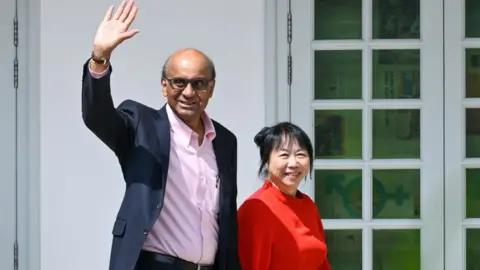 Mr Tharman, seen here with his wife Jane Ittogi, was always the clear frontrunner
Mr Tharman, seen here with his wife Jane Ittogi, was always the clear frontrunnerSingaporeans have chosen Tharman Shanmugaratnam as their next president - but many would have let out a small sigh of disappointment as they did so.
On Friday, the former top minister won a record 70.4% of the votes, comfortably beating two other candidates in the country's first contested presidential election in more than a decade.
Mr Tharman was always the clear frontrunner. Urbane, well-spoken and intelligent, he is highly regarded by Singaporeans and consistently polls as one of the island's most popular politicians.
Which was why, when Mr Tharman announced several months ago he was quitting the ruling People's Action Party (PAP) to run for president, many Singaporeans were baffled by what they viewed as a waste of his potential.
The role of president is a largely ceremonial one that holds little power, apart from having some say on the use of Singapore's sizeable financial reserves. It has even less say in public affairs - the government, which has the power to remove the president, has made it clear the president cannot speak too freely and has likened the role to the British monarch.
It is a figurehead role that many see suitable for a pleasant, uncontroversial person to inhabit, as has been the case with past presidents. But Mr Tharman is much more than that.
Besides helping to helm Singapore's political leadership as finance minister and deputy prime minister, the former economist has also held top council positions at global institutions such as the United Nations and the International Monetary Fund (IMF). At one point, he was even tipped to head the IMF.
Some Singaporeans thought that if he ever left the PAP, he would go on to make his mark in the international arena.
Even more hoped he could be prime minister. A survey some years ago saw him poll as the first choice to become PM after incumbent Lee Hsien Loong steps down. In general elections, Mr Tharman's constituency often scores the highest after Mr Lee's.
Part of this popularity stems from the fact that as a long-time deputy, Mr Tharman's reputation has been shielded from the slings and arrows of public criticism which Mr Lee has had to bear.
But the 66-year-old has also cultivated a gentlemanly image, and has refrained from engaging in personal attacks unlike some other politicians. This has played well with an electorate that likes its leaders genteel and statesmanlike.
Many felt he had the chops and stature to become that almost mythical creature - the first non-Chinese prime minister of Singapore - and break a glass ceiling that the government has long insisted is concrete.
Famous for their racial realpolitik, PAP leaders often reiterate that Singapore, a Chinese-majority country, is not ready to accept a minority PM.
Mr Tharman kept mum on this topic until last week when he said he felt Singapore was ready, sharpening the sting of disappointment among his supporters.
But Mr Tharman has also insisted he would not be good at being PM, and with the PAP's new leadership waiting in the wings, it could be said he was already on his way out. One theory is the PAP wanted him to run for president to help shepherd the next generation of leaders.
And so, he chose to run for president instead. Although Singapore has had non-Chinese presidents in the past, Mr Tharman is the first one voted in by the public.
His supporters could claim his victory as a win for representation and a repudiation of racism. In the lead-up to the election, some social media posts insisted that Singapore must have Chinese leaders. Mr Tharman's two competitors were both Chinese.
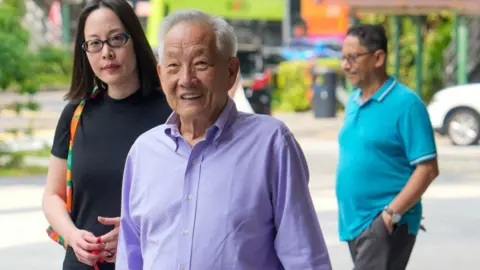 Ng Kok Song came in second behind Mr Tharman, with about 16% of the vote
Ng Kok Song came in second behind Mr Tharman, with about 16% of the vote
Ironically he has also blown apart the argument for a key PAP racial policy.
Prior to the presidential election in 2017, the government passed laws ensuring some polls would be restricted to minority race candidates. They argued the rules were needed to ensure better representation of minorities in Singapore, which include Malays, Indians, and Eurasians.
Those rules did not apply this time, so Mr Tharman has proven that a minority race candidate can win under their own steam - and resoundingly so.
For this reason, his victory "is certainly a win for race relations" in Singapore, said Mathew Mathews, a principal research fellow specialising in race at the Institute of Policy Studies.
But he added that the results "don't necessarily mean that Singapore society is race-blind", as race would likely be a bigger factor in a more even competition. The other candidates had CVs less distinguished than Mr Tharman's, or were less known.
Questions of influence
As with any election in Singapore, this one was seen partly as a referendum on the PAP, which has suffered rare political scandals recently.
Though Mr Tharman's landslide win can be largely attributed to his personal popularity which has always outstripped the PAP's, it also "shows that the party brand is not so toxic such that the association with it drags a person down", noted Walid Jumblatt Abdullah, an assistant professor in social sciences at Nanyang Technological University.
Still, the victory has also been overshadowed by questions about the PAP's influence. Mr Tharman was widely seen as the government-backed candidate.
Though he has insisted he will act independently, few believe this to be true of a man who has been one of the PAP's most loyal team players.
This election also saw renewed disgruntlement over its opaque and restrictive criteria. A potentially popular candidate, George Goh, was disqualified while a more controversial one, Tan Kin Lian, who had been accused of sexism and racism, was let in.
It echoed the 2017 election where the government's changes to the rules provoked anger and controversy.
Mr Tharman's win may have thus deepened the perception that the presidential race is increasingly rigged by the government.
There was even a movement urging Singaporeans to spoil their ballots in protest, though in the end that percentage was around the usual average of 2%, which showed "the overwhelming majority viewed this election worth partaking in and legitimate", Dr Abdullah said.
Mr Tharman ran on a campaign promising "respect for all", including "respect for different views and political leanings".
But it is not certain how he would achieve that as president in a system perceived as perpetuating the PAP's power - a system he helped to shape for decades.
This article has been updated to reflect the following: "In response, the Singapore government said that the qualifications required to run for President are not "opaque". The government added the criteria are spelt out in the Constitution and that its "Presidential Elections Committee issues a certificate of eligibility to applicants who meet the criteria." It also stressed that elections in Singapore are not "rigged" as a "transparent framework under the law has long ensured that elections are conducted freely and fairly in the country".
2... Singaporeans vote for ceremonial president after rare political scandals
https://www.bbc.com/news/world-asia-41237318?
By Frances Mao & Tessa Wong, BBC News, Singapore 31 August 2023
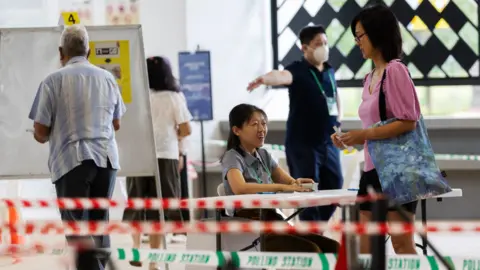 Citizens register to vote at a polling station for the presidential election in Singapore
Citizens register to vote at a polling station for the presidential election in SingaporeSingaporeans have headed to the polls to vote in their first contested presidential election in over a decade.
The president has a mainly ceremonial role in the city-state with few powers and little say in public affairs.
But the result on Friday could be a marker of public sentiment on the long-term ruling People's Action Party (PAP) following a string of MP scandals.
Leading candidate Tharman Shanmugaratnam was a veteran minister of Singapore's PAP.
A former deputy prime minister and finance minister, the 66-year-old economist resigned from the People's Action Party in June to contest the presidential election.
Prime Minister Lee Hsien Loong heads the PAP, which suffered one of its worst electoral showings in 2020 although it still retained more than a two-thirds majority in parliament.
This year the party's reputation has been damaged by a string of rare political scandals including a senior minister's arrest in a corruption probe, as well as two lawmakers' resignations over an extramarital affair.
Voters at polling stations told the BBC on Friday this could influence their vote.
"I think at this election some voters are expressing how they feel about the PAP and some are voting for who they want. It's 50-50 i would say," businesswoman Ms Tong told the BBC.
"But at least this time round people are more aware now of what the president can or cannot do."
The president acts as the custodian of the city's substantial financial reserves so Singapore requires its candidates to have either civil service or corporate experience.
Mr Shanmugaratnam is the frontrunner in the vote, the first to be contested in more than a decade - after outgoing President Halimah Yacob declined to contest a second six-year term.
The other candidates include Tan Kin Lian, a 75-year-old former insurance executive who has been criticised for social media posts he made in the past about women and Indians, and Ng Kok Song, a former wealth fund investment officer.
The candidates' ethnicities in the multicultural but majority-Chinese city-state has been one of the issues too - with some highlighting Mr Shanmugaratnam may become the first non-Chinese president to be elected by voters.
However a voter told the BBC on Friday race was not a factor.
"I always saw it about being the best candidate and not about race," said digital consultant Mr Anthony.
"I think we are far better off than other countries when it comes to race. I won't say we are past race entirely, but we have what it takes to move past it in time."
There has also been consternation among voters about the stringent restrictions on who can run for president.
They must have either served as a senior civil servant or the chief executive of a public company worth at least $500m Singaporean dollars (£292m; $370m).
Voting is compulsory for Singapore's 2.7 million eligible citizens.
3... Singapore: City-state rocked by rare political scandals
https://www.bbc.com/news/world-asia-66230766?
By Kelly Ng, BBC News, Singapore 19 July 2023
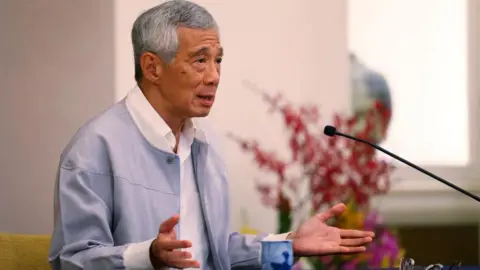 A string of political scandals in Singapore casts doubt on when Prime Minister Lee Hsien Loong can hand over the leadership reins
A string of political scandals in Singapore casts doubt on when Prime Minister Lee Hsien Loong can hand over the leadership reins
Singapore, known for its political stability, has been rocked by a string of rare political scandals.
Last week, a senior minister was arrested in a corruption probe, the first in four decades to be implicated in such an investigation.
And on Monday, two lawmakers - one of them once tipped as a potential prime minister - resigned after it was revealed they were in an extramarital affair.
It has shocked residents of the city-state, which prides itself on its reputation for clean governance and has the highest paid leaders in the world.
Analysts say the unfolding scandals could dent support for the ruling People's Action Party (PAP), which has been in power since 1959 and holds a large majority in parliament.
They also say it casts doubt over when Prime Minister Lee Hsien Loong can hand over the reins of leadership.
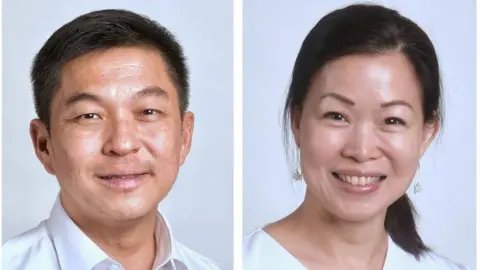 Tan Chuan-jin and Cheng Li Hui resigned over their "inappropriate relationship"
Tan Chuan-jin and Cheng Li Hui resigned over their "inappropriate relationship"
On Monday, Speaker of Parliament Tan Chuan-jin, 54, and fellow lawmaker Cheng Li Hui, 47, resigned from the party and the legislature over their "inappropriate relationship". Mr Tan is married, while Ms Cheng is single.
More questions on transparency arose last week, when Singapore's anti-corruption watchdog arrested Transport Minister S Iswaran and billionaire hotelier Ong Beng Seng. The two men played key roles in bringing the Grand Prix to Singapore in 2008.
Singaporeans were told last Wednesday that Mr Iswaran had been asked to take leave from his ministerial duties amid a probe.
Deputy prime minister Lawrence Wong has told local media the corruption probe would be "full, thorough and independent", and that nothing will be swept under the carpet.
But authorities only announced the arrests three days after they actually took place. Both men have not been charged and are currently out on bail.
The arrests came on the heels of allegations that two other senior ministers had rented colonial-era bungalows in a high-end neighbourhood at below-market rates.
While an anti-graft review cleared the two men, K Shanmugam and Vivian Balakrishnan, of wrongdoing, the matter sparked a heated debate on inequality in Singapore and political optics.
The unusual series of events has bought out the inevitable memes. "The writers of this season of Singapore have really outdone themselves," wrote the creators behind Instagram page yeolo.sg on Monday.
A separate post, featuring actresses on the set of the Barbie movie crowding around a laptop, read: "When me and the girlies are suddenly interested in sg politics."
Another Instagram user wryly compared the current political situation to spilling tea, or sharing gossip.
But beyond the jokes lie serious questions about the future of the PAP and how long it can hold on to Singaporeans' trust.
It has weathered similar scandals in the recent past - in the last decade a previous parliamentary Speaker and a backbencher stepped down because of extramarital affairs. But the close timing of the scandals and corruption probe has heightened voters' scrutiny.
The PAP has long prided itself on demanding high moral standards of its lawmakers, and its ability to keep its house in order. One of its founding members once compared joining the PAP to joining the priesthood.
Mr Lee this week defended his party's handling of the recent scandals, saying it demonstrated "how the system has to function".
"Sometimes things cluster up, but we make sure we put them right," he said, adding that "high standards of propriety and personal conduct… are the fundamental reasons Singaporeans trust and respect the PAP".
But other observers contend these controversies call into question Singapore's - and in particular, the PAP's - claims to exceptional governance.
"I think the biggest questions surround restraints on authority, oversight, transparency, the impartiality of parliamentary process as well as the PAP's claim that it is a sufficient check on itself," said Singapore-based political scientist Ian Chong.
He noted that the PAP has rejected political practices common in other developed jurisdictions, such as public disclosure of income and assets by political office holders, senior civil servants and their immediate family members.
There are no robust mechanisms for holding powerful people to account, added Michael Barr, an Australia-based international relations professor who has written several books on Singapore politics.
"You just have to trust them. That is why this is such a dangerous and novel set of developments for the government. They are trashing their repositories of public trust," he said.
Singapore is ranked the fifth-least corrupt country in Transparency International's latest Corruption Perceptions Index. Over the years, the government has justified seven-figure ministerial pay checks as a way to repress corrupt activity.
But Dr Barr pointed out: "Without extraordinary levels of public trust, the government must rely on one of two things to win elections: either repression and other measures that subvert democracy, or a high level of performance-based legitimacy. Their record in recent years is such that we can forget about performance legitimacy."
The recent events also cast doubt on when Mr Lee would step down.
The 71-year old, who has been prime minister since 2004, has often spoken of his wish to retire. A successor has already been designated: Lawrence Wong, who is also finance minister.
But on Monday, Mr Lee said he has no plans to call for an immediate general election. The next polls are due by November 2025.
The fact that Mr Wong has not been more active and visible in addressing the recent scandals also raises questions about him and his peers' readiness to take over as the city-state's leaders, noted Dr Chong.




